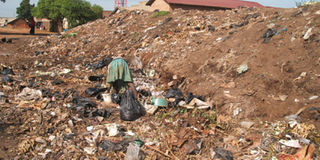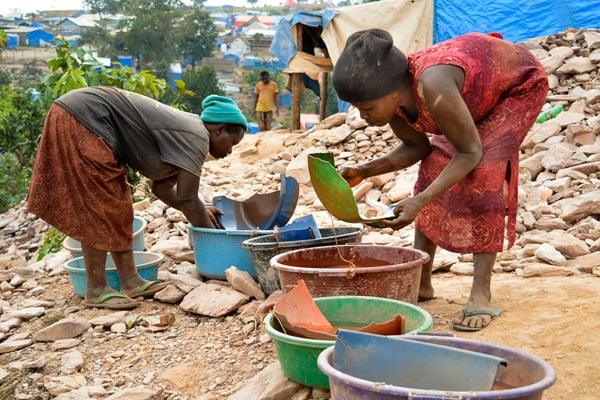Prime
Mbale now a shadow of its own past

A heap of garbage piles up near residential houses in Mbale. This is a common sight in the municipality today. Photo by David Mafabi
Mbale- Although the Mbale Municipality budgets have improved from Shs1.8 billion in 1998/1999 to Shs15 billion 2012/2013 with local revenue collection of Shs1.5 billion, there is nothing on ground to reflect this.
“The municipal council has failed to translate the money into development because the leaders come in to enrich themselves and go away without leaving any mark on ground,” said Mr Rogers Kimaswa, a former councillor.
People who lived in the town in the 1970s and 1980s will tell you with nostalgia about the days when Mbale was the cleanest town in East and Central Africa.
Mr Kyemuswa Wanyoto, 71, remembers when Mbale gained reputation as the cleanest town in East Africa, and the then president Apollo Milton Obote referred to it as the “Jewel of East Africa”.
On June 26, 2006, Mbale town marked 100 years since being declared a township by the colonial government on June 26, 1906.
The history
By 1951, the town had built modern offices on what is now called Republic Street and after independence in 1962, the Mbale Municipal Council was the first town to be granted official status of an urban authority.
According to historians, the town developed along a low ridge at the foot hills of Mt Nkokonjeru, now Wanale Hill.
Visible from all parts of the town with its picturesque cliffs, escaping waterfalls and green cultivated slopes. The Wanale ridge supplements the town’s allure. The white rocks along the hills are spread on the hills.
Mr Anthony Wanestosi, an elder says Mbale’s beginnings can be traced to an ivory tusks gathering site. The site had numerous rocks locally called Zimbale from which the district derived its name Mbale (stones).
Mr Wanetosi notes that with the support of the colonial masters, the then colonial agent, Mr Semei Kakungulu, transformed Mbale into a commercial and metropolitan town.
“Development enterprises like African Textile Mills served markets in Kenya, Tanzania, Sudana, Congo and Zambia which helped the town to grow. The industries maintained roads, kept buildings clean; Mbale depended on them for survival. Their collapse meant the collapse of Mbale town,” said Mr Wanetosi.
However, the industries, roads, and planned infrastructure are no more. The industries stopped working decades ago; everything about Mbale seems deplorable.
Today, the physical plan of the town has been grossly mismanaged with buildings haphazardly erected on road reserves, sewerage lines, in wetlands, street alleys, all in total disregard of the urban authorities’ laws and regulations.
Heaps of garbage, human excreta in polythene bags damped in street alleys, old dilapidated buildings and poor sewerage systema are all that is left. The town is a shadow of its own past.The Minister of Justice, Maj Gen Kahinda Otafiire, once said of Mbale municipality authorities as lacking in capacity to effectively handle the municipality’s physical planning and development after he discovered that gazetted spaces such as nursery beds, rugby grounds, Uhuru parks and public open areas had been fraudulently allocated to developers by municipality technical staff and politicians.
What went wrong?
The town’s health and education services were highly coveted. Mbale regional hospital was the best referral hospital; drugs shortage and understaffing which are common today were unheard off.
However, today the wealthy go to Mulago or even across the borders to Kenya for better medical care while for ordinary folks, the area health units have become death traps.
Most streets in Mbale town are flooded with vendors’ merchandise with Naboa Road, Central Road and Bishop Wasikye road the most affected. During afternoons and evening rush hours, the town is thrown into total confusion as vendors, buyers and pedestrians blend along the busy lanes. The confusion is further aggravated by noise generated from giant speakers used by the traders to attract customers.
Potholes are a common sight in the town and its surrounding suburbs; road maintenance has been very poor. With substandard and inefficient contractors, it is easy for roads to return to their original run-down state two to three months after repair. The roads lack proper paving and adequate drainage systems, a thing that contributes heavily to their short lifespan.
The vices
Mbale Municipality has for long been dogged by corruption scandals.
The Mayor, Mr Richard Masaba, was interdicted and arrested in 2007, but reports of financial impropriety have continued. Most recently, the former Town Clerk, Mr Norbert Turihikayo, was interdicted for the fraudulent purchase of 1,200 acres of land in Bulambuli district in which the municipal council lost Shs950 million but this has had no impact still.
Mr Davies Mwaule, a former speaker at Mbale municipal local government, says: “We mismanaged the town ourselves; look at the type of leaders we elect to the council and mayoral positions: hungry, greedy and would want to use any opportunity to make money for themselves. Even worse, they buy the votes to get there so they have to get their money back,” said Mr Mwaule.
Mr Robert Kimaswa, a former councilor at the municipal local government says although the 2012/ 2013 budget under the theme Strategic Priorities to Accelerate Prosperity for all was estimated at Shs15 billion with local revenue collection of Shs1.5 billion, there is nothing on ground to reflect this.
“As a municipal council we have failed to translate our budget into the development of the municipal council, a number of Councillors just come to the municipal council to enrich themselves and go away without leaving any mark at all on ground,” said Mr Kimaswa.
Mr Robert Masinde, a councillor, says the town is also experiencing typical problems associated with urban areas such as high population growth and unemployment, lack of basic urban services and inadequate waste management besides poor waste disposal, poor sanitation, pollution of water sources, and deforestation.
“The main challenges facing land in Mbale include lack of land owned by the municipality, haphazard developments on the existing land, over population, and pollution and greedy by the technical staff at the municipal council,” said Mr Masinde.
About Mbale town
Mbale is a city in eastern Uganda. It is the main municipal, administrative and commercial centre of Mbale District and the surrounding sub-region. The district is named after the town.
Mbale lies approximately 245km by road, northeast of Kampala, on an all weather tarmac highway.
Figures
Shs1.8b: The amount of money allocated to Mbale Municipality in 1998/1999 budget.
Shs15b:The amount of money allocated to Mbale Municipality in 2012/2013 budget
Shs1.5 b: The amount of money from local revenue collection in Mbale Municipality



